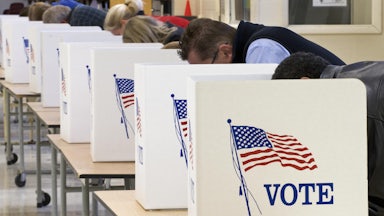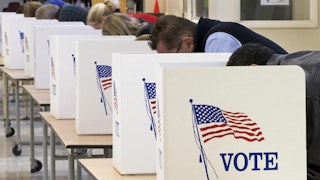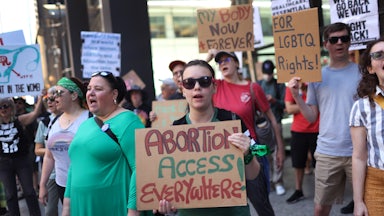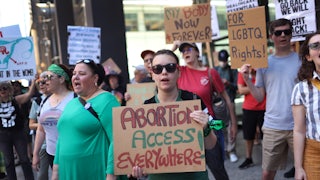A simple narrative about abortion in the November election has already taken root: that the end of Roe is a gift for Biden and a potential landmine for Trump. Campaign reporting in numerous outlets has emphasized that successfully navigating the abortion issue is key to winning the White House but that it will require deft messaging from both campaigns. Biden, we are told, will benefit from the Dobbs decision by condemning Republicans for helping to overturn Roe. Trump, in turn, could please his base by taking credit for the Supreme Court’s ruling, although that risks alienating so-called moderates.
What this narrative misses is that there is a big difference between abortion as it exists in the presidential campaigns and abortion as it currently exists in the United States. Voters’ views, contrary to the conventional narrative on abortion and elections, are much more confusing than broad poll questions about their support for making abortion legal would indicate. All this means that a presidential campaign waged on abortion is necessarily entangled in these divides. Biden and Trump may be hoping they can just run on Roe, but in doing so, both candidates are running from reality.
The latest entry in the dominant abortion election narrative comes from The New Yorker. In “Donald Trump’s Abortion Problem at the Polls,” Margaret Talbot explains that abortion is a political risk for Trump, who may lose supporters given the harsh reality of a world without Roe, which has reportedly increased public support for abortion. The premise is, Trump gains at the polls by appearing more moderate on abortion, by backing off a national abortion ban, and by rewriting his own role as having merely “returned” abortion to the states, not banned it outright.
We have been hearing his abortion story for months, in a few variations. First, news outlets reported Trump was holding out on offering support for a national abortion ban, not wanting to appear too extreme by making abortion a federal crime. Then it was that Trump was deliberating over how early in pregnancy abortion should be made a crime. “One thing Mr. Trump likes about a 16-week federal ban on abortions,” The New York Times reported, recounting internal discussions, “is that it’s a round number. ‘Know what I like about 16?’ Mr. Trump told one of these people, who was given anonymity to describe a private conversation. ‘It’s even. It’s four months.’” Reporters correctly noted that Trump was yet again engaging in a transactional approach to abortion, quoting a campaign spokeswoman promising Trump would “sit down with both sides and negotiate a deal that everyone will be happy with.”
But reports about the Trump campaign’s internal art-of-the-deal haggling over abortion miss a far simpler reality. A coalition of anti-abortion think tanks, attorneys, and elected officials preparing for Trump’s return to the White House argue that a national abortion ban is already on the books, in the form of the 1873 Comstock Act. Whether Trump really has “returned” abortion to the states or whether he would support a national abortion ban at a certain number of weeks, is beside the point. All Trump needs to do is appoint leadership in the Department of Justice who would be willing to bring Comstock Act prosecutions. Whatever “trouble” Trump has with abortion in this election narrative is pretty far removed from the actual damage Trump could do as president.
The Democratic mirror image of this abortion horse-race narrative is likewise a few steps removed from reality. Biden, in these stories, is the pro–abortion rights candidate, who promises a return to Roe, a not-too-distant past, where we were safe from the shocking realities elevated by his campaign and his supporters. The campaign has pledged to tie Trump to every ban or restriction on abortion. Electing Biden, then, is offered as the remedy to the post-Dobbs horrors they blame on Trump: the criminalization of abortion pills, the denial of abortion in medical emergencies, the surveillance of pregnancy, the police poring through our private messages, the prospect of pregnancy checkpoints and police forcing people to take pregnancy tests.
Unfortunately for the campaign, and especially for those caught in the legal dragnet, those horrors existed for many people even before Dobbs. It’s just that they were playing out in the largely ignored intersection of the criminal legal system and reproductive rights, falling hardest on people who are pregnant and Black, Indigenous, poor, or without citizenship. The war on drugs has for decades been used as a license to police pregnancy, whether through targeted enforcement of “fetal harm” laws to prosecute someone for having a miscarriage or stillbirth, or to regard miscarriage or self-managing an abortion as murder. For immigrants, driving within one’s own state to get an abortion means passing through Customs and Border Protection checkpoints, risking arrest, detention, or deportation. Pregnant people’s mobile phones and search data have been used against them to charge them with “feticide,” even where abortion is legal, and threaten them with decades in prison. None of this began with Dobbs.
The loss of Roe isn’t a story of abortion suddenly becoming criminalized when it wasn’t before. It’s a story of what happens when people who never thought of themselves as subject to state power suddenly realize that it’s aimed at people like them too. “Maybe the most persuasive factor is simply the realization that a bedrock decision about such intimate and life-altering matters could be wrested away by the state,” Talbot mused in The New Yorker. She’s not wrong. This realization is now hitting those who considered themselves to be pro-choice, who considered abortion to be settled law, or who imagined that a Democrat in the White House was enough.
These are the voters Biden is now attempting to woo: voters who have long considered themselves insulated from these debates because they perceive a big gap between the law being applied to other people (mostly poor people, most likely people of color, maybe in other states) and the law being applied to them. They’re the mirror image of Republicans who publicly say abortion should be a crime but would still have or help someone have one because they don’t expect to actually be punished. (Trump is probably one of these people.) Self-described pro-choice voters who thought abortion was always going to be legal for them are the people Biden and Democrats more generally are relying upon right now. To court them with horror stories of other people’s pregnancy outcomes, while neglecting to convey that such stories are not new, may score votes, but it will be premised on what can quickly become misinformation.
It may feel like Dobbs has increased public support for abortion, but three major polls don’t register much change in opinion. Gallup has run the same abortion poll around once a year for decades—in which a majority of respondents, since 1989, said they thought Roe should not be overturned. As for support for legal abortion, in May 2023, Gallup found that 34 percent of respondents said abortion should be legal in any circumstances. In May 2022, it was 35 percent; in 2021, 32 percent. Pew has found similar numbers over the years, with an increase of just a few points in support for abortion being legal in most cases since Dobbs and a slight decrease in those who want abortion to be legal in all cases. Overall, Dobbs appears not to have significantly changed people’s views on whether abortion should be legal.
A few findings in the 2024 Pew poll further complicate the image of abortion as a broadly popular get-out-the-vote issue. About six in 10 respondents (58 percent) said it would be easy for someone to get an abortion in the area where they live, and only 31 percent of respondents said it should be easier. (It’s not immediately clear how those groups overlap.) Among Democrats specifically, only 48 percent wanted obtaining an abortion to be easier. This suggests that while a majority of people in the United States think that abortion should be legal in all or most cases, about just as many think it’s easy to get one, and some people don’t think it needs to be any easier—including many Democrats.
That gap might seem strange or counterintuitive. But it is not uncommon, even among people who support legal abortion, for those same people to lack an understanding of what is legal for them to do versus what is accessible to them. Perhaps that explains those data on people who support the idea of abortion being legal but aren’t so concerned about making it accessible—people who maybe Biden is counting on. This dissonance confronts other Democrats too: While Governor Gavin Newsom is taking steps to turn California into an abortion “haven” for people in Arizona who are facing strict bans, many counties in his state have no clinics, while ostensibly blue-blue-blue cities like Beverly Hills reject plans to open new clinics.
There’s also some evidence to suggest that even people who know about new anti-abortion laws don’t understand what those laws do. While 60 percent of Texans of reproductive age had heard about abortion laws recently passed in the state, according to a 2023 survey conducted by the nonprofit Resound Research for Reproductive Health, 73 percent didn’t know that abortions were no longer available in Texas clinics, due to the state’s near-total abortion ban. At the same time, around a quarter of those surveyed thought that Texas had made it a crime to travel to another state for an abortion. (Traveling to another state for an abortion remains legal; ordinances pushed by anti-abortion attorneys and advocates have helped to stoke the confusion.) When the legal landscape always appears to be shifting, for many people, it is impossible to keep up.
A truly head-scratching New York Times/Siena poll published this month showed that nearly one in five voters recently surveyed in battleground states, such as Georgia and Michigan, believe Biden is more responsible for Dobbs than Trump—broken down by party, 22 percent of Republicans said Biden was more responsible, along with 12 percent of Democrats. One Democratic pollster called those confused about abortion “a pickup opportunity for Democrats” who could be won over if they understood Trump’s opposition to abortion rights. Democratic strategists, then, seem to be banking on abortion mobilizing voters, even if what voters think they know about abortion is unfounded.
Whatever Trump or Biden might actually support on abortion, they are both running on this kind of abortion phantasm: one in which ending Roe was everything—which it wasn’t—and in which a president can restore Roe—which he cannot. Whatever their stances, each benefits from supporters who aren’t going to press too hard on the details. And much of the political press, along with abortion rights and anti-abortion groups, seems happy to help the candidates run on abortion as a matter of pure vibes. Both campaigns seem to assume, maybe correctly, that voters are moved more by the idea of Roe than the situation where they live. They might not know they live somewhere where abortion is now a crime.








